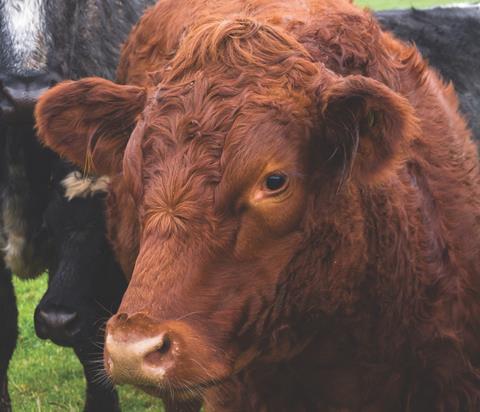Meat processors are increasingly embracing a farm to fork approach to sustainability as they are placed at the crux of food production between producers and retailers/consumers.

The British meat processing sector is a leader on the field of sustainability. We are not talking the greenwashing of major food corporations, 2050 targets delegated to the next after next chairman and vexing issues passed on to suppliers or far-away subsidiaries. It has been quietly and sensibly getting on with the task of developing the circular livestock economy at factory and overall company level. For instance, many plants now adhere to ISO 14001 environmental management standards and ISO 50001 energy management standards.
Meat processors are increasingly embracing a farm to fork approach to sustainability as they are placed at the crux of food production between producers and retailers/consumers. There was certainly a time in the past when the ‘ostrich policy’ was generally adopted. Then came the time of major retailers stinging companies into action. We have now entered in a third phase when sustainability has become a core value to businesses and plays a full part in company strategies. Firms are also communicating on their achievements, developing Internet sites, producing videos and publishing reports.
We present here some revealing examples chosen amongst many…
ABP strives for leadership on sustainability
According to its dedicated sustainability website ABP, the largest beef British beef processor, has lowered its carbon emissions by 20% with combined heat and power technology, creating a solution with three distinct outputs: electrical power, heated water, and refrigeration, with no energy waste. ABP has also reduced its waste and water usage and increased its level of recycling, achieving 100% by-product usage. It is a founding member of the Plastic Action Alliance. The Cahir plant in Ireland was the first food processor in Europe to achieve the European Water Stewardship (EWP). The company was awarded the International Food Award in 2019 for its work on sustainability. ABP has achieved Platinum Level in Business in the Community’s 2020 NI Environmental Benchmarking Survey for going above and beyond their legal environmental requirements. The company has also developed a biodiversity-enhancing programme and promotes sustainable grazing. ABP reckons that 95% of the carbon emitted from farm to fork is done so by livestock and the company is putting efforts in communicating with its livestock suppliers in order to reduce their methane emissions.
“These many initiatives prove that ABP takes its environmental responsibilities seriously and does not shy from investing in a carbon-neutral future.”
A special mention must be made of the Ellesmere plant in Shropshire. It is now a carbon neutral facility as certified by the Carbon Neutral Company, the first of its kind in the world. The plant is powered by innovative combined heat & power (CHP) engine fuelled by animal fats recovered on site – together with bio-fuels derived from used cooking oil from ABP’s renewable division, Olleco.
Olleco is not a very well-known business but deserves wider recognition. Created in 2006, the ABP subsidiary collects and transforms used cooking oil and food waste to biogas, biodiesel and compost. It now employs 1,000 people in Britain and operates five used cooking oil processing plants, a biodiesel plant, a bulk liquid storage facility and three state-of-the-art anaerobic digestion plants. Olleco was one of just two finalists in an enterprise category of the 2019 Circulars Awards, an initiative of the World Economic Forum and won McDonald’s Sustainable Supplier of the Year Award in 2017. In addition, as part of its ‘circularity’ business, ABP also operates a by-products/protein division that acquired the John Pointon & Sons Ltd. rendering plant in Staffordshire in 2020 as well as the C&D petfood business with seven factories in Europe, including two in the UK.
These many initiatives prove that ABP takes its environmental responsibilities seriously and does not shy from investing in a carbon-neutral future.
Foyle’s new sustainability initiative launched in 2020 despite Covid-19
For a well-focused business such as Foyle Meats, developing a coherent environment programme with ambitious targets for 2025 and 2030 is essential. The new policy focuses on ‘pastures, product, people and planet.’
Greater communication with livestock farmers includes important sustainability matters such as slurry management and rotational grazing with the aim of reducing greenhouse gas emissions by 14%. As a business, Foyle Meats wants to reduce food waste, water use and energy consumption and increase plastic recycling. Furthermore, the company is committed to train and engage staff to ensure environmental and energy practices are deliverable.
Kepak: sustainability at its core
Kate O’Driscoll, Kepak’s head of sustainability drives initiatives across the 14 sites the company operates in Great Britain and Ireland. The business has produced a remarkable sustainability report which highlights its progress in decarbonation, the support to biodiversity and the reduction of food waste, water usage and plastic packaging.
Kepak has signed the Courtauld Commitment 2025 and the UK Plastic Pact. It has also joined the Tamar initiative, which aims to protect the river in Devon and Cornwall.
Pilgrim’s global might
Pilgrim the owner of two major British meat processors, Moy Park and Tulip, now Pilgrim’ Pride UK, is a global business with global ambitions. The company has signed up to the United Nations Global Compact in order to become a net-zero business by the end of the decade. Its sustainability Internet site can be reached at sustainability.pilgrims.com

In the UK, both companies have developed over the years a comprehensive sustainability programme. Moy Park can boast major achievements such as reducing energy use on a like-for-like basis by 70% between 2010 and 2019, its water usage by 53% and its CO2 intensity by 70% on the same basis. On the pork side, the business has been very active in burnishing its sustainability credentials for many years. For instance, as a leading pig farmer, the company has put a great emphasis on limiting the use of soya from sustainable sources in diets to a commendable 8%.
Green ambitions for Samworth Brothers
As part of its ‘4R’ programme, the company has installed solar panels on new builds, reduced energy consumption in its operations and vehicle fleet, signed up pledges on waste and plastic reduction. On a like-for-like basis, the firm has lowered its energy consumption by 30% between 2008 and 2020 and now only uses ‘green energy’. Water usage has been reduced by 30% between 2016 and 2020. Carbon Desktop, a monitoring and targeting system for utilities has been installed across its 19 businesses “providing visibility of usage and opportunities for reduction”. In addition, Samworths has been particularly successful in tackling all its food waste by reprocessing it for human consumption and use in anaerobic digestion.
Samworth Bros ‘4R’ circularity plan
Samworths has become signatories of the Plastic Pact, the Courtauld 2025 Commitment and the IGD/Wrap Food Waste Reduction Road Map, pledging support to Ben Elliott’s ‘Step up to the Plate’ initiative.
Dawn Meats and Dunbia ‘Naturally Better’
The company’s ambition is clear: “To become Europe’s most sustainable meat company” and, to be fair, Dawn Meats and Dunbia have been striving for years to achieve this lofty goal, having produced its first sustainability plan in 2009. The company has produced an 85-page Corporate Social Responsibility report highlighting progress across the business. Its efforts are led by the “Sustainability Executive” a cross-functional group of managers chaired by the CEO, Niall Browne, and supported by environmental teams in the UK and Ireland covering the 22 production sites.
Work includes on-farm initiatives to reduce emissions from cattle and sheep, help with the preservation of peatland, the ethical sourcing of livestock and ingredients, and the collaboration with hauliers to reduce fuel use. The company plans to reduce its energy and water intensity by 40% on a like-for-like basis by 2025 using 2009 as baseline, and its emission intensity by 50%. KPIs are monitored by a team across the group. Finally, the company has developed comprehensive biodiversity policies.
Dawn Meats has won the Greenstar sustainability awards for its work on plastic packaging. Dawn Meats has signed up to the SBTi (Science-based targets initiative), the first European beef and lamb processor to do so. The initiative is a is a collaboration between the Carbon Disclosure Project (CDP), the United Nations Global Compact (UNGC), World Resources Institute (WRI), and the World-Wide Fund for Nature (WWF).
Many other commendable corporate initiatives
The companies, whose activity we have looked at above, are all large multi-site, most often with an international outlook. However, about all large and mid-size British meat processors now include sustainability in their corporate plan. One must mention, by alphabetical order Alec Jarrett, Avara Foods, Dovecote Park, Euroquality Lamb, Fairfax Meadow, Farmers’ Fresh, Gressingham, Hilton Food Group, Karro Foods, Kerry Foods, Linden Foods, Pickstock Ashby, Pickstock Telford-OSI, Randall Parker, Scotbeef, Tönnies UK, Two Sisters Food Group, Westaway, Woodhead Bros (sorry if we missed a few!).
“If anything, the industry is guilty of not airing and promoting its substantial investment and achievements, leaving the ambit of communication to negationists.”
Even smaller processors, wholesalers and butchers now think on their impact on the environment and are cutting their water and energy usage. They are also more and more ‘thinking green’ and are aiming to increase recycling and the use of recyclable packaging, and eliminate waste, be of food, by-products or packaging.
British meat processors have also a large influence on the sustainability of British farming through their supply choices, for example in opting for local grass-fed beef, sustainably produced imported meat and food ingredients.
Far from laggards…
This review has found no example of ‘greenwashing’ but evidence of an industry quietly getting on with the task of increasing circularity with the aim of achieving carbon neutrality in the future. The real picture is a world away from what is described by pressure groups, vested interests and the media, keen to denegrate the meat sector.
If anything, the industry is guilty of not airing and promoting its substantial investment and achievements, leaving the ambit of communication to negationists. One can be too understated. For example, although many worthwhile videos are available on the Internet, they are not vigorously promoted and only attract a limited viewing mainly of interested parties, but not from the greater public. Communication should be done in lay terms. Branded retail and food service products do not yet include mentions of sustainable production and real carbon impact on labels. Finally, processors should not shy from what constitutes a ‘sustainable diet’ with meat at its core.
Still, sustainability is a journey. The meat processing sector is vigorously engaged in its reconfiguration as a fully sustainable industry, a good omen for the future.
First published in Meat Management print magazine March 2021.
This story was originally published on a previous version of the Meat Management website and so there may be some missing images and formatting issues.

















